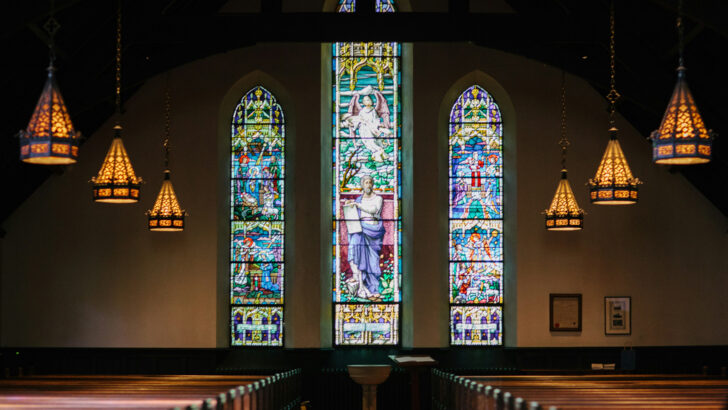Roman Cabay
To those who knew me then, the idea of my conversion was an absurd prospect. I was raised non-denominationally protestant, variously attending Anglican and Methodist services as well as Sunday school. Church, to me, was an interminable lecture where I fruitlessly attempted to achieve apostasy. Faith was a private certainty of my damnation my various shortcomings. Eventually the inability to rationalise my obvious condemnation to eternal punishment with the notion of an omnipotent and loving creator broke the inertia of inherited piety and I resigned myself to a militant and hopeless atheism. I somnambulated in the manner characteristic of the postmodern generations towards an increasingly vulgar and hollow opinion of the world- man being a cosmic accident, consciousness an electrical phenomenon, existence an arbitrary imposition. Many people have had an ‘epiphany’, a ‘come to Jesus’ moment’ or a ‘moment of clarity’- a very brief spiritual experience which irrevocably precludes the possibility for a vulgar, empirically atheist view of the world. I had one such experience and resolved myself to pursue faith. Ultimately, the only attractive option was Roman Catholicism, to the point that I’d resolved myself to converting by the first semester of my last university year without ever having attended a mass in my life.
Elements
For an insight into the mind of the convert, I’ll highlight two of the most important elements of Catholicism in my life. Throughout my familiarisation with the faith, the apparent unpopularity of Confession among liberal Catholics has baffled me; besides the theological necessity of the sacrament, Reconciliation was something I was impatient for- Confession is to the soul what medicine is to the body. Imagine a man shambling about, delirious from blood loss yet refusing medical attention, and you understand the silent weight of guilt that hangs on the shoulders of the unconfessed. Of course, a full pursuit of grace must be wrought by deed as well as rite. Even so, the sacrament of Reconciliation provides a genuine opportunity for a confrontation with oneself. Private reflection over one’s wrongs often fails as it may become self-congratulatory- minimising one’s wrong-doing out of pride- but arguably worse, it may become self-pitying. Wallowing in one’s guilt is a common kind of arrogance, one which asserts oneself uniquely hideous, dotted with a singular agency by which one has irredeemably condemned himself- and therefore can seek or expect no personal improvement. Most pride in our generation is the pride of self-hatred, embracing the comfort of giving up because it’s easier to think yourself intractably worthless than it is to confront your demons and improve as a person. Confession compels one to accept that they are not special: you, just like everyone else, have been forgiven for your sins- you need only accept it. The key contradiction at the heart of Protestantism is that there is an absolute, uncompromisable truth which all people must recognise and live by… but also that this truth may only be interpreted and put into effect by disparate private individuals. This, of course, had the effect of causing protestant denominations split and multiply like cells in a petri dish, but moreover it raises an obvious theological problem. If your church values individual judgement so much, and indeed split off from another branch to preserve this, it becomes very susceptible to misinterpretation.
Argument
I recently got into an argument with a Baptist who derided my faith in the Holy See for her various shortcomings but by what standard should she be measured? Against the “worst” Baptist church, or the “best”? Furthermore, if I set out a standard of morality by which to judge, on what authority is it based? Merely stating “the Bible” is practically refusing the question- Jehovah’s Witnesses and megachurch evangelicals promising riches to their followers demonstrate that it is in fact very easy to create an insane cult which is “based” on the Bible. Fundamentally, the non-hierarchical system is incredibly susceptible to perversion by bad or incompetent actors for any number of reasons, and this requires constant vigilance by its parishioners: having no guarantee that a pastor is telling you the truth, you must second-guess his every word with reference to scripture and refer to your own judgement as a basis of faith. If I can’t have a guarantee of the truth at church, well, why on Earth am I going? ‘Amen’ doesn’t mean ‘I agree’. I’m sure you’re aware of the rich intellectual tradition among Catholic scholars, and that the faith’s history of erudition has been impressed upon you.
Are we so unworthy that any attempt at ordering ourselves towards God is doomed to fail? Is constant fracture and theological bickering the best we can hope for?”
Well, I’m here to tell you that Catholicism is just as much the religion of fools and ignoramuses. Your friar may be borderline illiterate, but if he performs the rites correctly his worship and yours are entirely valid. Similarly, the world’s most wretched cretin (it could be you or me, folks!) can go to mass or pray the rosary at peace. These are methods of worship which have been sanctified from on high with divine authority. The considerable fallibility of individuals’ judgement is shorn from the question entirely.
Finally, there’s something conceptually depressing about the notion that no human institution could be worthy of dictating religious law. Is man so fallible that he must be condemned to a primitive and simplistic understanding of religion? Are we so unworthy that any attempt at ordering ourselves towards God is doomed to fail? Is constant fracture and theological bickering the best we can hope for? For no reason more complex than simple faith, I want to believe that we can dare to believe in one holy, catholic, and apostolic Church.



